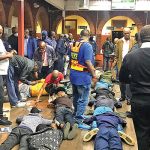Foreign nationals in Pietermaritzburg have spoken out about harassment by police, and immigration policies that mean they can’t earn an income.
Speaking during an interview with Weekend Witness at the height of the campaign by members of the Dudula organisation to drive foreign nationals out of the country, the immigrants dismissed accusations that they were seizing economic opportunities meant for locals.
Girma Helimo, a tuck shop owner who hails from Ethiopia, said his business in Pietermaritz Street was “a hand-to-mouth†operation.
He said: “I’m not rich. I’m running this business so that I can have something to eat. I must work 18 hours a day to stay alive. No one in the world wants to work like that.â€
Dudula, which is known for its anti-foreigners’ campaign called Operation Dudula, which seeks to drive out all foreigners who came to search for employment in South Africa, has been involved in attempts to eject foreign nationals from their tuck shops in Johannesburg.
The organisation, which last week was prevented by police from embarking on an anti-foreign nationals protest in Durban, is scheduled to launch its branch in Durban today.
Among other things, Dudula wants locals to take over tuck shop businesses currently run by foreign nationals. The operation enjoys support from some communities. According to Dudula leaders, foreign nationals are amassing wealth at the expense of locals.
However, Helimo said the tuck shop and other informal businesses which the foreign nationals are currently running, were “businesses for the desperateâ€.
“When we left our countries we had big dreams — we wanted to become big players in the economic, social, and other spheres of society.
“In my case, I dreamt of being a politician who would one day change the world. But look where I am today. I find myself being an informal trader in a country far from home. I have no doubt that I would have been doing something big if it were not for the bad political situation in my country,†he said.
Helimo, who is also the leader of the Ethiopian community living and trading in Pietermaritz Street, denied that the foreign nationals were trading illegally.
“Our immigration documents are in order. Some people have asylum documents while others have been granted citizenship. Yes, there may be a few who cut corners but most of the traders here pay taxes — they are registered with SARS.â€
Rosemary Uaykani, a DRC national who runs a vegetable business from the side of the road in Church Street, said she was involved in a battle for survival as opposed to running a business.
“It’s a tough business. I must be here at 6 am and leave late in the evening. At times South Africans also come to sell but they don’t last long because its quite a demanding business with very little profits.
“I have three kids and if I were a South African, I would be sitting at home as I would be earning child grants. But as a foreigner I must find a way to survive,†she said.
As vendors, Uaykani said, foreign nationals were often exposed to crime and police brutality. “At times criminals rob us of the little money we make. Police, who are supposed to protect us, also abuse us. If they get bored, they just come and order us to leave. They even take our stock,†she said.
Freeman Chakarise, who hails from Zimbabwe, said it was difficult for a foreign national to find employment in South Africa.
He said: “As Zimbabweans we are not here out of choice — things are tough back home. This is why the South African government issued Zimbabweans with work permits. But even when all our immigration documents are in order, companies are reluctant to employ us. As a result, we end up doing odd jobs to survive.â€
Most of the foreign nationals currently in the country claim to be refugees fleeing from either persecution or economic hardship in their respective countries.
According to the home affairs department guidelines, potential refugees should be issued with a Section 23 permit on arrival at the South African boarder. The permit allowed the foreign nationals to visit one of the department’s offices to apply for a Section 24 permit valid for six months.
Most of the foreign nationals currently in the country hold a Section 24 permits.
“But even when people have these Section 24 permits they are still treated as illegal immigrants by the police and some members of the community,†Helimo said.



